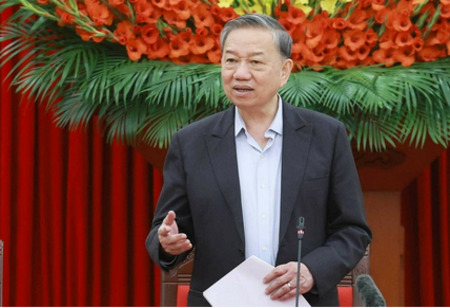
Party Chief Sets Guidelines for Feedback on Draft Documents

 The General Secretary of the Party underscored that legal and institutional changes are intended to bolster the rule of law and establish a socialist society that is governed by, for, and of its citizens. Nevertheless, he acknowledged ongoing difficulties, noting that while laws might be conceptually clear, their practical enforcement is frequently problematic, and policies that seem sound in theory can encounter substantial obstacles during local application.
The General Secretary of the Party underscored that legal and institutional changes are intended to bolster the rule of law and establish a socialist society that is governed by, for, and of its citizens. Nevertheless, he acknowledged ongoing difficulties, noting that while laws might be conceptually clear, their practical enforcement is frequently problematic, and policies that seem sound in theory can encounter substantial obstacles during local application.
He advocated for an open discussion about the fundamental reasons for the disparity between the creation of laws and their execution. He raised concerns about why some thoroughly drafted and detailed laws, decrees, and circulars still result in grassroots officials being reluctant to act, businesses facing compliance issues, and citizens experiencing confusion. He requested clarification on areas of overlap, differing interpretations of regulations by ministries and sectors, and instances where authority is delegated in a manner that makes officials responsible for issues outside their purview.
Also Read: Vietnam's Legislator Meets Russian State Duma Chairman in Ha Noi
He emphasized that the legal framework needs to be straightforward to recall, comprehend, and apply. He further stated that legislative language should be succinct and clear, precluding any possibility of misinterpretation, misuse, or circumvention.
According to him, each policy must demonstrate quantifiable outcomes, possess manageable risks, and, most importantly, simplify rather than complicate processes.
He commented that an effective law is one that functions effectively in reality, not merely one that reads well.
Concerning the establishment of a socialist State governed by the rule of law, the Party leader stated that Vietnam must cultivate a state that is robust without being oppressive, orderly yet connected to the populace, decisive in its actions while also being compassionate, persuasive, and receptive to discussion. He stressed the importance of clearly defining these objectives within the documents of the 14th National Party Congress.
He stated that for decentralization, authority delegation, and organizational structure, power should be passed down to lower levels when those levels can operate more effectively and be more accessible to the public than higher authorities. This delegation, however, must be supported by adequate resources, staff, equipment, and legal protections, enabling officials to act and assume responsibility confidently in the public interest, free from excessive personal risk.
Also Read: OpenAI Taps Ex-Google Korea Chief to Spearhead Seoul Office
Concerning the proposed two-tier local administration framework, the Party leader encouraged delegates to offer specific suggestions for its design, ensuring that citizens maintain a close relationship with government bodies and that public services are delivered without interruption.
He emphasized the importance of a robust connection among the Party, the State, the Viet Nam Fatherland Front, various socio-political organizations, and the populace. He noted that the Party should exercise complete leadership without exceeding its mandate, the government should operate within legal boundaries and with accountability, and organizations like the VFF should serve as a bridge between officials and citizens, who should actively engage in oversight and cooperation.
Also Read: Financial Regulator Urges Petrochem Sector on Restructuring
Furthermore, he underscored the Party's leading and governing function within both the legal framework and practical governance. As the ruling party, the Communist Party of Viet Nam is accountable to the people for the nation's progress and the well-being of its citizens, by formulating policies, overseeing their execution, and taking responsibility for the results.

